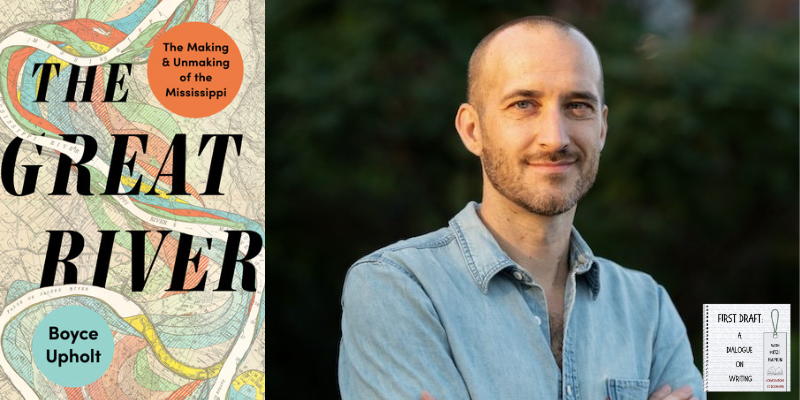
Boyce Upholt on Finding Hope in Dark Times
In Conversation with Mitzi Rapkin on the First Draft Podcast
First Draft: A Dialogue of Writing is a weekly show featuring in-depth interviews with fiction, nonfiction, essay writers, and poets, highlighting the voices of writers as they discuss their work, their craft, and the literary arts. Hosted by Mitzi Rapkin, First Draft celebrates creative writing and the individuals who are dedicated to bringing their carefully chosen words to print as well as the impact writers have on the world we live in.
In this episode, Mitzi talks to Boyce Upholt about his new book, The Great River.
Subscribe and download the episode, wherever you get your podcasts!
From the episode:
Mitzi Rapkin: We’ve talked so much about the ways the Mississippi has been used and controlled. What about today? Where do you find hope and where do you find opportunity?
Boyce Upholt: That’s a good question. Hope and opportunity. These days, less and less. But beyond the river, I don’t know. The past few weeks have felt like dark times in various ways, the past few years and so interestingly I find the river does give me hope in the midst of a lot of political crises, in that it is just a place that I can go to. Weirdly, the house I live in three blocks from the river, but there’s a big wall there and a port by my house so I have to drive 15 minutes to get to a place where I can actually see the river, but I do like to go sometimes and walk down into the little bit of batcher in a park here in New Orleans, and take my dog down and let him swim around and just remember, like, oh, for all that we’ve done, here it is, this powerful thing that remains polluted and changed, but also undiminished in many ways. But I think you’re also asking, largely about hope for what the river can become. And I don’t know what hope I have. There’s a big study going on that the Army Corps is trying to think about how to use all these gates and floodways that they’ve built in new ways. There’s an effort underway, it was underway here in Louisiana to release some river water in an attempt to build more marshes, but since I finished the book and filed it, there’s been a lawsuit, as I sort of suggested there probably would be in the book, and work has stopped on that, and that whole project may never be built. And so, in some ways, we’ve done so much, as I was saying earlier, there’s not really a good way forward. The river is going to persist, right? It’s going to be here longer than we’re here. That’s not super hopeful, because my ideal would be that the river can persist and humanity can persist, and we can work together. I guess in some ways, I find hope, as I’ve learned about pre-American ways of thinking about the river, I have been very compelled by what I have learned from the earthworks. There’s a lot of other Mississippi River books coming out this year, by happenstance, and I find a lot of them are very parallel to mine in the way they’re looking at seeing things. And so, I have this hope that more and more people are looking at the river and hopefully looking wherever they call home, and saying, like, Oh, we’ve been doing this wrong. And like, we’ve got to sift around and find some better ways of thinking. And we need more of that. And so, I would encourage everyone to go to the Mississippi or go to whatever your river is, or find wildness where you are, and fall in love with it and find ways to think about how to make it better.
***
Boyce Upholt is a journalist and essayist whose writing has appeared in the Atlantic, National Geographic, the Oxford American, and Virginia Quarterly Review, among other publications. He is the winner of a James Beard Award for investigative journalism, and he lives in New Orleans, Louisiana. His book is called The Great River: The Making & Unmaking of the Mississippi.
First Draft: A Dialogue on Writing
First Draft: A Dialogue on Writing is a literary podcast produced and hosted by Mitzi Rapkin. Each episode features an in-depth interview with a fiction, non-fiction, essay, or poetry writer. The show is equal parts investigation into the craft of writing and conversation about the topics of an author’s work.



















